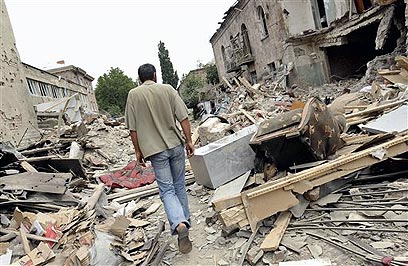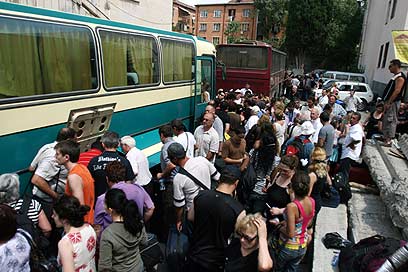
Georgia agrees to modified Russia peace plan
Tbilisi says will accept version of agreement proposed by Moscow to end hostilities in South Ossetia. France's Sarkozy heads to region as mediator amidst conflicting reports of whether fighting has stopped. Meanwhile Washington threatens Russian membership in global clubs
French President Nicolas Sarkozy and his Georgian counterpart Mikheil Saakashvili said on Wednesday they had agreed to a modified version of a peace plan with Russia over the breakaway region of South Ossetia.
Russian President Dmitry Medvedev ordered a halt to military operations in Georgia on Tuesday in support of the international peace plan promoted by Sarkozy, who flew to Georgia after meeting Medvedev in Moscow.
"It is a political document. It is an agreement of principles ... and I think we have full coincidence of principles," Saakashvili told a joint news conference with Sarkozy.
The changes made had been approved by Medvedev and included removing a reference to talks on the future status of South Ossetia, the two men said.

Destruction in Gori (Photo: AP)
Medvedev ordered a halt to military operations in Georgia on Tuesday, but US officials could not confirm fighting had ended and threatened Moscow's membership in important global clubs.
The United States is also likely to cancel a joint naval exercise with Russia to show its disapproval of Moscow's military actions in Georgia, US officials said. "Frankly, the entire Medvedev agenda is at stake here," a senior US official said.
The United States would like to see Russia's plans to integrate into international organizations succeed, but "that's what's at stake when Russia engages in behavior that looks like it's from another time," the official said.
Both Russia and Georgia have now declared a ceasefire, but each side has accused the other of failing to keep its promises. The fighting erupted when Tbilisi tried to retake by force the pro-Russian region of South Ossetia last week. Moscow responded with a massive counter-offensive.
In a first US reaction to the ceasefire, Washington's envoy to the region, Matthew Bryza, termed the Russian move "extremely positive."
But American officials in Washington later adopted a harder line, pressing Russia to halt military operations and threatening Moscow's membership in organizations such as the World Trade Organization, the Organization for Economic Cooperation and Development and the Group of Eight.
Crisis pervades US elections
Republican presidential candidate John McCain continued hammering Russia on Tuesday, telling a cheering audience that he had spoken again with Saakashvili to assure him of America's moral support.
"Today we are all Georgians," the Arizona senator proclaimed. McCain said Moscow is using ''violence against Georgia to send a signal'' to ''any country that chooses to associate with the West.'' Russian leaders, he said, must realize they risk ''the benefits they enjoy from being part of the civilized world.''

Tourists fleeing Georgia (Photo: Tzur Sheizaf)
McCain, who has called for Russia to be expelled from the Group of Eight, the world's most powerful industrialized countries known as the G-8, gave no ground in his criticism of the Kremlin leadership and what he views as its increasingly autocratic rule.
Democratic opponent Barack Obama also took on the crisis in the restive Caucasus region, declaring from his Hawaiian vacation that ''it is past time for the Russian government to immediately sign and implement a cease-fire. Russia must halt its violation of Georgian airspace and withdraw its ground forces from Georgia, with international monitors to verify that these obligations are met.''
Both candidates have joined in severely scolding the Kremlin for invading Georgia, but their words and tone offered a window into the significant differences in how the candidates would conduct future US-Russian relations.
Of the two, only Obama saw room to criticize both sides in the first serious foreign policy crisis to flare since they began their one-on-one battle for the White House, saying Monday that ''there is no possible justification for these attacks,'' while noting that ''Georgia should refrain from using force in South Ossetia and Abkhazia, and a political settlement must be reached that addresses the status of these disputed regions.''
Reuters and the Associated Press contributed to this report










